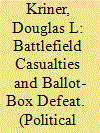| Srl | Item |
| 1 |
ID:
172688


|
|
|
|
|
| Summary/Abstract |
In the 2016 election, foreign policy may have played a critically important role in swinging an important constituency to Donald Trump: voters in high-casualty communities that had abandoned Republican candidates in the mid-2000s. Trump’s iconoclastic campaign rhetoric promised a foreign policy that would simultaneously be more muscular and restrained. He promised to rebuild and refocus the military while avoiding the “stupid wars” and costly entanglements of his predecessors. At both the state and county levels, we find significant and substantively meaningful relationships between local casualty rates and support for Trump. Trump made significant electoral gains among constituencies that were exhausted and politically alienated by 18 years of fighting. Trump’s foreign policy shows a president beset by competing militaristic and isolationist impulses. Our results suggest that giving into the former may come at a significant electoral cost.
|
|
|
|
|
|
|
|
|
|
|
|
|
|
|
|
| 2 |
ID:
113556


|
|
|
|
|
| Publication |
2012.
|
| Summary/Abstract |
Do voters reward presidents for increased federal spending in their local constituencies? Previous research on the electoral consequences of federal spending has focused almost exclusively on Congress, mostly with null results. However, in a county- and individual-level study of presidential elections from 1988 to 2008, we present evidence that voters reward incumbent presidents (or their party's nominee) for increased federal spending in their communities. This relationship is stronger in battleground states. Furthermore, we show that federal grants are an electoral currency whose value depends on both the clarity of partisan responsibility for its provision and the characteristics of the recipients. Presidents enjoy increased support from spending in counties represented by co-partisan members of Congress. At the individual level, we also find that ideology conditions the response of constituents to spending; liberal and moderate voters reward presidents for federal spending at higher levels than conservatives. Our results suggest that, although voters may claim to favor deficit reduction, presidents who deliver such benefits are rewarded at the ballot box.
|
|
|
|
|
|
|
|
|
|
|
|
|
|
|
|
| 3 |
ID:
140820


|
|
|
| 4 |
ID:
141649


|
|
|
|
|
| Summary/Abstract |
When influencing the allocation of federal dollars across the country, do presidents strictly pursue maximally efficient outcomes, or do they systematically target dollars to politically influential constituencies? In a county-level analysis of federal spending from 1984 to 2008, we find that presidents are not universalistic, but particularistic—that is, they reliably direct dollars to specific constituents to further their political goals. As others have noted, presidents target districts represented by their co-partisans in Congress in the pursuit of influence vis-à-vis the legislature. But we show that, at much higher levels, presidents target both counties within swing states and counties in core states that strongly supported the president in recent elections. Swing state particularism is especially salient during presidential reelection years, and core partisan counties within swing states are most heavily rewarded. Rather than strictly pursuing visions of good public policy or pandering to the national median voter, our results suggest that presidents systematically prioritize the needs of politically important constituents.
|
|
|
|
|
|
|
|
|
|
|
|
|
|
|
|
| 5 |
ID:
134934


|
|
|
|
|
| Summary/Abstract |
Scholars have long conceptualized public support for war as the product of a cost–benefit calculation in which combat casualties factor significantly. This article argues that, when calculating the human costs of conflict, Americans care about more than just the number of war dead; they also care about the distribution of those casualties across society. Using two original survey experiments, we show that inequalities in sacrifice affect Americans’ casualty sensitivity. We find strong evidence that learning about socioeconomic inequalities in casualties in previous wars decreases Americans’ casualty tolerance toward future military endeavors. These effects are stronger for some mission types, particularly non-humanitarian interventions, than others. The effects are also concentrated among Americans from states that suffered high casualty rates in the Iraq War. Our results suggest that raising public awareness of inequalities in wartime sacrifice could significantly strengthen popular constraints on policy makers contemplating military solutions to future crises.
|
|
|
|
|
|
|
|
|
|
|
|
|
|
|
|